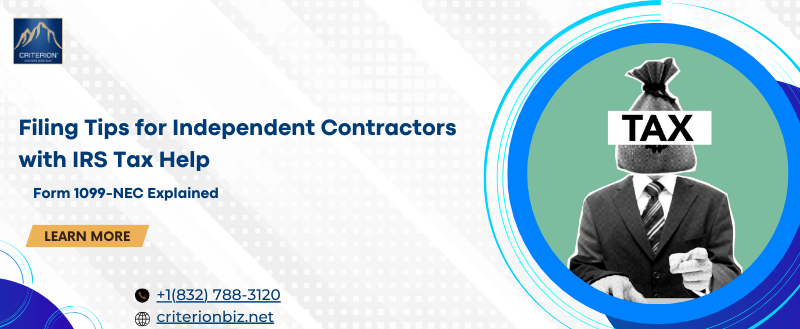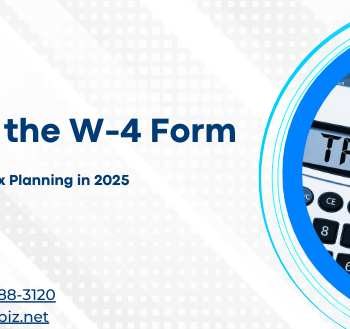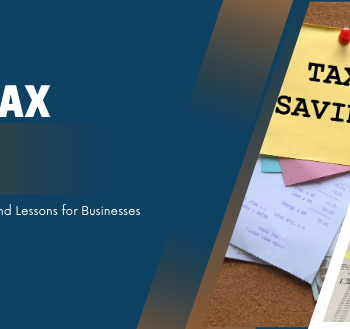
Form 1099-NEC Explained: Filing Tips for Independent Contractors with IRS Tax Help
- On January 23, 2025
Tax season often brings stress and confusion for independent contractors, freelancers, and gig workers. Filing taxes correctly is crucial to staying on the right side of the IRS, and understanding Form 1099-NEC is a significant part of the process. This comprehensive guide will help you navigate Form 1099-NEC, explore potential tax deductions, and explain how professional tax relief services and IRS tax help can make your tax season stress-free.
What is Form 1099-NEC?
Form 1099-NEC is a tax form that businesses use to report nonemployee compensation (NEC) paid to individuals who are not employees. These individuals include freelancers, gig workers, and independent contractors who provide services. Payments considered NEC include:
- Fees for services rendered
- Commissions earned
- Any other payments related to professional services
If a business pays you $600 or more in NEC during the tax year, it is required to issue Form 1099-NEC. As the contractor, you’ll receive Copy B of this form for your tax records.
The History of Form 1099-NEC
Form 1099-NEC was introduced in 2020, replacing the practice of reporting NEC on Form 1099-MISC. This change was made to streamline tax reporting and reduce errors. Today, Form 1099-MISC is used exclusively for other types of income, such as rent, royalties, and prizes, while all NEC is reported separately on Form 1099-NEC.
Who Receives Form 1099-NEC?
You will receive a 1099-NEC if you meet the following criteria:
- You Are an Independent Contractor
You work independently, providing services like graphic design, writing, or consulting. - You Perform Gig Work
If you’re a gig worker for platforms like Uber, Lyft, DoorDash, or similar services, your earnings may be reported on a 1099-NEC. - You Provide Specialized Services
This includes home repair, cleaning, tutoring, or other on-demand services.
Regardless of whether you receive a 1099-NEC, you’re required to report all income earned during the year, even if the total is less than $600 or the business fails to issue the form.
Why Is Form 1099-NEC Important?
The IRS uses Form 1099-NEC to track income earned by independent contractors. Accurate reporting ensures you stay compliant with tax laws and avoid potential penalties, such as fines or audits. Neglecting to report income, even unintentionally, can trigger significant issues with the IRS.
How to File Taxes with Form 1099-NEC
Filing taxes when you have a 1099-NEC is a bit different from filing taxes as an employee. Here’s a step-by-step guide:
Step 1: Report Nonemployee Compensation
Enter the income from Box 1 of your 1099-NEC on Schedule C. This form is used to calculate your profits or losses from self-employment.
Step 2: Calculate Self-Employment Taxes
Complete Schedule SE to calculate Social Security and Medicare taxes owed on your self-employment income.
Step 3: Pay Quarterly Estimated Taxes
Self-employed individuals are responsible for making quarterly tax payments using Form 1040-ES. These payments help you avoid penalties for underpayment.
Tax Deductions for Independent Contractors
One of the benefits of being self-employed is the ability to deduct legitimate business expenses. These deductions lower your taxable income and reduce the amount of tax you owe. Common deductions include:
- Office Supplies: Pens, paper, printer ink, and other materials for your workspace.
- Business Travel and Mileage: The cost of travel for work purposes, including car mileage, flights, and lodging.
- Software and Tools: Subscriptions to software or tools essential to your work, such as Adobe Creative Suite or Microsoft Office.
- Marketing Expenses: The cost of advertising your services, including website hosting, social media ads, and business cards.
- Home Office Deduction: If you work from home, you may be eligible to deduct a portion of your rent, utilities, and internet expenses.
Understanding the Qualified Business Income (QBI) Deduction
The QBI deduction allows eligible self-employed individuals to deduct up to 20% of their pass-through business income. This deduction is an excellent way to further reduce your taxable income, but it comes with specific requirements and limitations.
Common Mistakes to Avoid
When filing taxes with Form 1099-NEC, avoid these common pitfalls:
- Failing to Report All Income
The IRS receives a copy of every 1099-NEC issued to you. If you fail to report the income, it may trigger an audit. - Not Paying Quarterly Taxes
Quarterly estimated payments are a requirement for self-employed individuals. Missing these payments can result in penalties. - Overlooking Deductions
Not taking advantage of all eligible deductions can lead to paying more taxes than necessary. - Mixing Personal and Business Expenses
Ensure you maintain clear records and separate accounts for business and personal finances.
Addressing IRS Challenges
What Happens If You Owe Taxes?
If you owe taxes but cannot pay in full, consider the following options:
- IRS Payment Plans
Set up an installment agreement to pay your tax debt over time. - Offer in Compromise (OIC)
This allows you to settle your tax debt for less than the total amount owed if you meet specific criteria. - Penalty Abatement
If you can demonstrate reasonable cause, the IRS may waive penalties.
Partnering with the best tax relief company ensures that you receive tailored support for your unique tax needs.
Common Questions About Form 1099-NEC
Here are answers to some frequently asked questions:
1. Who Files Form 1099-NEC?
Businesses are responsible for issuing 1099-NEC forms to contractors who earned $600 or more.
2. Do I Report Income Below $600?
Yes, you are required to report all income, regardless of whether you receive a 1099-NEC.
3. What Happens If I Don’t File?
Failure to file can result in penalties, interest, and increased scrutiny from the IRS.
4. When Is the Deadline?
Businesses must issue Form 1099-NEC by January 31, and independent contractors must file taxes by the federal deadline, typically April 15.
How Criterion Can Help
Criterion Business Services offers expert tax solutions designed to meet the needs of independent contractors. Whether you need help with tax preparation, IRS audit representation, or tax debt resolution, our team is here to guide you every step of the way.
Our services include:
- Comprehensive Tax Planning
- IRS Compliance Assistance
- Penalty and Interest Reduction
- Customized Tax Solutions
Contact Criterion Business Services Today
Navigating Form 1099-NEC and tax season doesn’t have to be overwhelming. With the right help, you can file confidently, maximize deductions, and minimize stress.
Let Criterion Business Services simplify your tax process with professional expertise in:
- IRS Tax Help
- Tax Relief Services
- Audit Representation
- Debt Resolution
Contact Criterion today to learn more about our tailored tax solutions and how we can support your business success. Take the first step toward a stress-free tax season now!




0 Comments